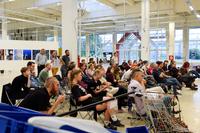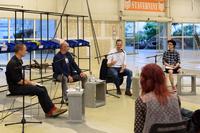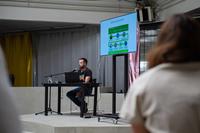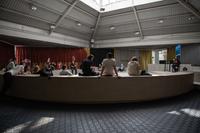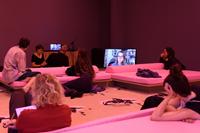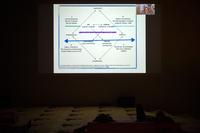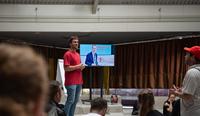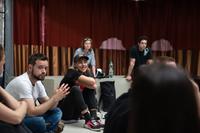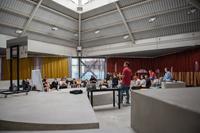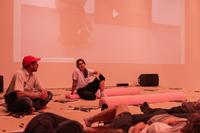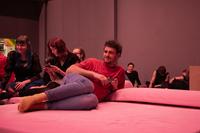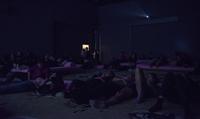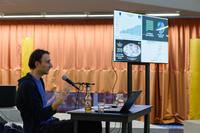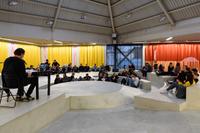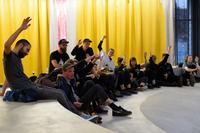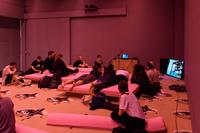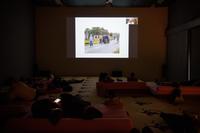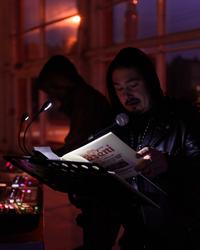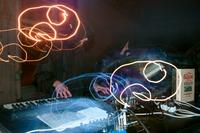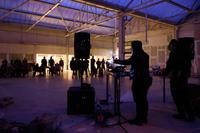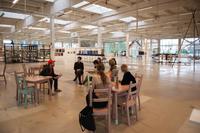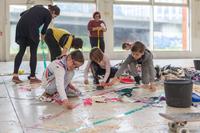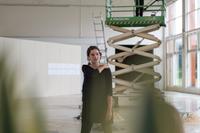Retreat:
A Heap Made of a Grain of Sand
A four-day programme on non-growth strategies and deceleration processes. The retreat is part of the Sand in the Gears exhibition.
Karel Belda – CEO of OZO Ostrava s.r.o.
Václav Drozd – political scientist, journalist and union organiser
Jakub Černý – psychologist, social worker and therapist
I love 69 Popgejů – audio-visual duo
Cyril Klepek – director of the digital waste market Cyrkl (Brno)
Vojtěch Kundrát – chemist and visual artist
Tomasz Rakowski – ethnologist, cultural anthropologist and doctor
Eva Rossal – cultural anthropologist, scientist and curator
Apolena Rychlíková – documentary filmmaker, publicist and journalist
Kateřina Šebestová – Deputy Mayor of the City of Ostrava for the Department of Environmental Protection
Marika Volfová & Mikuláš Černík – visual artist & sociologist
Alex Vonsík – member of the Food not Bombs Ostrava collective
Artists of the Sand in the Gears exhibition
Curators/coordinators:
Jakub Adamec – PLATO dramaturge and curator, audio-visual artist
Pavel Sterec – visual artist and teacher at the Faculty of Fine Arts at Brno University of Technology
What do we need to unlearn to get rid of (estranged) work and preserve (meaningful and fulfilling) activity? How to guide art institutions towards non-growth? How to slow down while avoiding atrophy? How to deal with “care” while not devaluating it in art practice by pompous aestheticization? What can union organising, the chemistry of materials, creative ethnography and anthropology teach us at present about the toxicity of performance but mostly about repose? Let’s integrate the experience of isolation and deceleration enforced upon us by the pandemic to overcome our anxiety and use this experience for social and environmental benefit.
The workshop follows immediately the opening of the Sand in the Gears exhibition, which is part of our 2020 cycle “Intensities”. Both the exhibition and the workshop deal with the nature of intensity as a generally shared characteristic of the present-day world via an attempt to speed up the process of deceleration. Sabotage of productivity and non-growth are at their core.
In the course of the four full-day programme, participants of the Sand in the Gears project (artists, scientists, opinion journalists, psychologists) and the public will make each other stronger in non-growth strategies. They will try to formulate principles of how to free oneself from the imperative of performance for performance and of performance for growth and how to integrate those often heavy experiences caused by the slowdown brought by the pandemic and social isolation that has unexpectedly entered our lives. It has influenced the preparation of the project, reframed its overall meaning and transformed the personal experience with deceleration of all the participants. Individual stops will take place in the “library of materials”, i.e. in the heart of the Sand in the Machine exhibition, or it will be used as a departure point. The material aspect of waste will serve us as a bridge to themes such as overabundance, poverty and uneven distribution, and stagnation.
Some of the artists invited will create their work for the Sand in the Machine exhibition only after the workshop, thus gradually adding content to the exhibition. The workshop programme aims at exhibition participants and public alike (its afternoon and evening sections). The workshop will feature fixed programme sections as well as open ones which will be filled in by improvised programme and discussions open to all gallery visitors.
“1,000,000 grains is a heap.
If 1,000,000 grains is a heap then 999,999 grains is a heap.
So 999,999 grains is a heap.
If 999,999 is a heap then 999,998 grains is a heap.
So 999,998 grains is a heap.
If …
… So 1 grain is a heap.”
Jakub Adamec and Pavel Sterec
Václav Drozd is a political scientist, journalist, and union organiser. He graduated in Political Science at the Charles University in Prague. Between 2016 and 2019 he worked as an editor in the online daily Alarm. He works as a union organiser in Central European Organising Center and helps employees of multinationals improve their working conditions. He is also active in the movement for climatic justice. He lives in Prague.
Mikuláš Černík is a PhD student at the Department of Environmental Studies at the Faculty of Social Studies at the Masaryk University in Brno. He is active in the movement for climatic justice The Limits Are Us and a member of RESET: a platform for social and ecological transformation.
Jakub Černý is a psychologist, social worker and therapist. He worked in the field of drug use, dependencies, and mental health. As a supervisor, lecturer and activist he supports projects related to social change and emancipation of people with personal experience with the above mentioned, e.g. in the Street Support project. Černý is one of the founding members of Narativ, an association dedicated to the development of collaborative and dialogue-led practice in the Czech Republic, to structural and political aspects of mental health and the related support system. He is active in Ostrava and Brno.
The audio-visual group I Love 69 Popgejů was founded in 2001 in Valašské Meziříčí by Jakub Adamec and Pavel Pernický (Marius Konvoj), graduates of the Intermedia Studio at the University of Ostrava. Between 2005–2007 the group ran the Strážná věž Gallery in Ostrava. The group creates its own trends, thus becoming a true phenomenon of the Czech underground and independent scene. I Love 69 Popgejů is active in Ostrava.
Vojtěch Kundrát is a chemist and visual artist, a PhD student at the Faculty of Chemistry at the Brno University of Technology and a student in the Intermedia Studio at the Faculty of Fine Arts at the Brno University of Technology. He focuses on development aid and development of affordable technologies for water purification without electricity. He is the co-author of sunscreen for the disadvantaged albino population in western Africa. He enthusiastically discovers the world of art and how it blends into other spheres of human activity, including chemistry and industrial technologies. He lives in Brno.
Tomasz Rakowski is an ethnologist and cultural anthropologist, an Associate Professor at the Institute of Ethnology and Cultural Anthropology, University of Warsaw, and also a medical doctor with speciality in A&E medicine. His research interests include social art, phenomenological anthropology, post-socialist transformation, anthropology of poverty and anthropology of development. Rakowski led ethnographic field research in Poland and Mongolia. He lives in Warsaw.
Eva Rossal is a cultural anthropologist, scientist and curator. She works in the Ethnographic Museum in Krakow and collaborates with the Institute of Ethnographic and Cultural Anthropology at the Jagiellonian University in Krakow. Rossal focuses on experimental collaboration between socially engaged, participative, useful art and anthropology, anthropology of fashion and clothing, a new methodology of ethnographic research and usefulness of anthropology beyond the academia. She led field research in Poland and Italy. She lives in Krakow.
Apolena Rychlíková is a document filmmaker, opinion journalist and journalist. In her work, she deals with the issues of inequalities, social exclusion, feminism, ecology and affordable housing. She is an in-house editor of the A2larm.cz server, a commentator for Salon (Právo daily) and external commentator for Czech Radio Plus. Her documentary film Hranice práce (The Limits of Work) won the 2017 Best Czech Documentary Film Award at the International Festival of Documentary Films Ji.hlava and the Czech Film Critics Award. She lives in Prague.
Marika Volfová is a visual artist and PhD student at the Faculty of Fine Arts at the Brno University of Technology. She focuses on the research of visual strategies of environmental movements and is also an activist from the Limity jsme my (Limits Are Us) movement. She lives in Brno.
Curators/coordinators:
Jakub Adamec is PLATO dramaturge and curator, member of the audio-visual group I Love 69 Popgejů. He worked for the Czech Centre in Warsaw (Poland), Třinec City Gallery and in Ostrava gallery Strážná věž (Watch Tower). Adamec is a graduate of the Intermedia Studio at the Faculty of Fine Arts and Music at the University of Ostrava. He lives in Ostrava.
Pavel Sterec is a visual artist and teacher. A graduate from the Academy of Arts and AAAD in Prague, Sterec teaches at the Faculty of Fine Arts at the Brno University of Technology. He is interested in non-scientific research, interdisciplinarity, radical pedagogy, methods of unlearning, and user-oriented art. He lives in Prague.
Only in Czech.
Programme:
- –Workshop:Pavel Sterec: The art of non-growthWorkshop for high school students.
- –Lecture:Vojtěch Kundrát: Mass for nothingLecture on the chemistry of materials beyond the borders of industrial use.
- –Discussion:Recycling behind the rainbow of binsDiscussion with representatives of dumpster diving [searching bins and taking foodstuff and things found in them] from Food Not Bombs organization, Ostrava City Hall, OZO Ostrava company and digital waste market Cyrkl.
- –Lecture:Tomasz Rakowski: Shared space, individual space – art, ethnography and every dayLecture for those interested in the dialogue between artistic and ethnographic-anthropological method.
- –Workshope and lecture:Eva Rossal: Creative ethnography – assumptions, ideas, processesWorkshop and lecture on research making use of contemporary art, cultural animation and ethnography.
- –Workshop:Václav Drozd: On manager’s solar plexusWorkshop about union organising for employees of (cultural) institutions.
- –Friday Cinema with Discussion:Apolena Rychlíková: Manifest jiné práce (2016) and Biologicky předurčené k chudobě (2018)Film screening and discussion.
- –Lecture:Moments of collective pleasure in the time of the industry of happiness (part 1)Lecture and discussion about possible responses to fatigue, dissatisfaction and spleen in the culture of individuation and acceleration.
- –Performance reading:I Love 69 Popgejů / Josef Váchal: Sermon ad calendas graecas against the sin of hastePerformance reading
- –Workshop for families:The Best Possible Screenplay / An Imaginative Warm-UpSunday workshop for parents with children with artist Monika Volfová and sociologist Mikuláš Černík.
- –Seminar:Moments of collective pleasure in the time of the industry of happiness (part 2)Seminar about possible responses to fatigue, dissatisfaction and spleen in the culture of individuation and acceleration.
←→
Special thanks to the Ministry of Culture of the Czech Republic and Moravian-Silesian Region.
